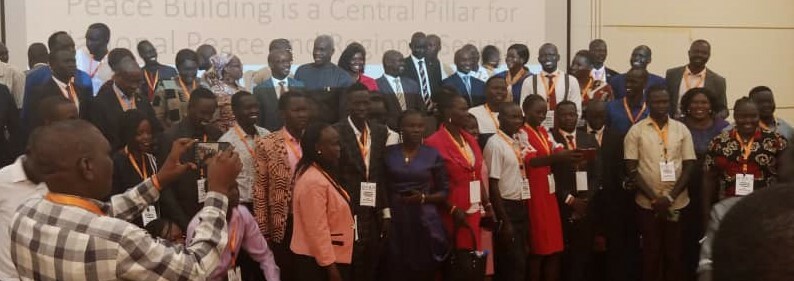The United Nations Population Fund (UNFPA), in collaboration with the United Nations Educational, Scientific and Cultural Organization (UNESCO), on Wednesday launched a three million US dollar Youth Leading Peace project in South Sudan aimed at promoting youth participation in peacebuilding processes.
Under the theme, “Youth Inclusivity in Peacebuilding is a Central Pillar for National Peace and Regional Security.” The two-year project will empower young women and men to participate and lead peacebuilding processes across the ten states and three administrative areas.
It comprises three strategic levels; 1) Focusing on community-led activism and empowerment of young Women and men to effectively participate in peacebuilding, 2) Establishment and operationalization of the youth inclusive peace forum in selected states to facilitate youth participation in peacebuilding processes, and 3) Development of costed national strategy based on state-level consultations and implementation respectively.
Speaking during the launch of the project his opening remarks, Stephen Par Koul, the National Minister of Peacebuilding, said the project is timely because it will have a positive impact on the lives of young people who are always used as instruments of destruction.
Koul said the conflict background of South Sudan has always been the reason most people are engaging in conflict, pointing out that the 21-year war of the liberation struggle plus the 2013 and 16 have all contributed to the current attitude.
“Today, the Youth in South Sudan are used either in political or community conflicts. Youths are just like empty paper. They can be used for anything good or bad. This project is timely and central to peacebuilding because our Youth are being as tools of conflict,” he said.
Minister Koul suggested that “Instead of us who organized political violence, leading the peace process, I think the peace process should be led by the youth.”
“Youth need different skills. I have seen one thing in my village. That the youth we lost to the war of illiteracy and the war of liberation struggles and the war of change, and I mean the war of 2013 and 16. In this period of 10 years, we have lost the majority of our youth to illiteracy. And you know human talent can be channelled to anything. I have seen in my village that our youth become sharpshooters. They learn how to kill,” he explained.
He also explained the fact that most youths across the country had involved themselves in harmful activities such as cattle raiding and killing innocent lives simply because they have learned to kill.
Julius Banda, the country representative of UNESCO has said government and peace partners in South Sudan must find ways to engage young people in peace processes across the country and also include youth in economic activities.
“It is very important that the government and its partners embrace economic inclusion by empowering young people economically to prevent them from involving in inter-communal conflicts and cattle raiding,” Band warned.
“Talking about the enabling factors for youth to engage in peace and security, we have to also look at the issue of education. Education is a principal enabler of youth peace and security in a country where the literacy rate Is around 34 percent,” he explained.
The UN official further acknowledged that investing in young people in South Sudan is very important because it guarantees their participation in society in relation to peacebuilding.
The Youth leading peace project, which is to be implemented by the Ministry of Peacebuilding and various partners, is a two-year project that is intended to cover the ten states and three administrative areas.
The program is in connection with United Nations resolutions 2250: participation, protection, prevention, partnerships, disengagement and reintegration, as well as the institutionalization of the youth, peace and security agenda and recommendations to how member states, the Security Council, the UN and regional organizations must invest in the youth, peace and security.




